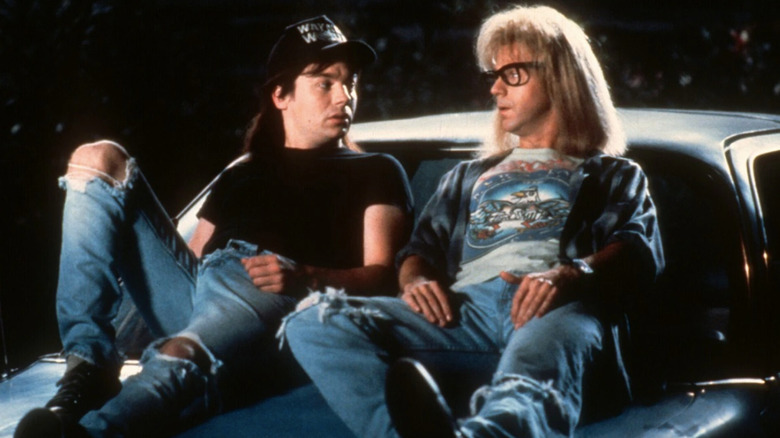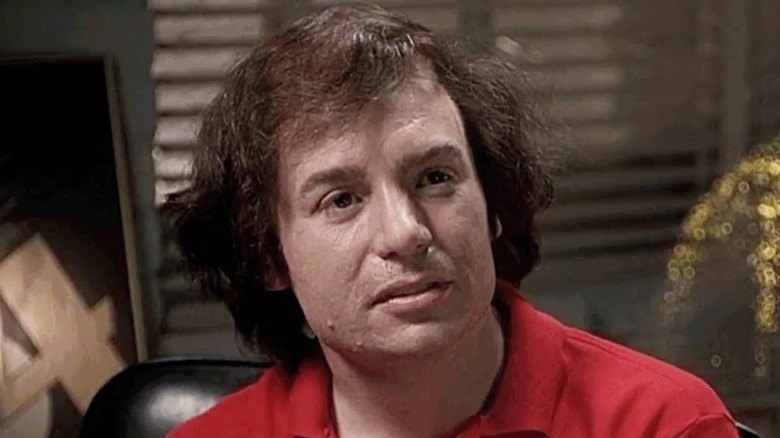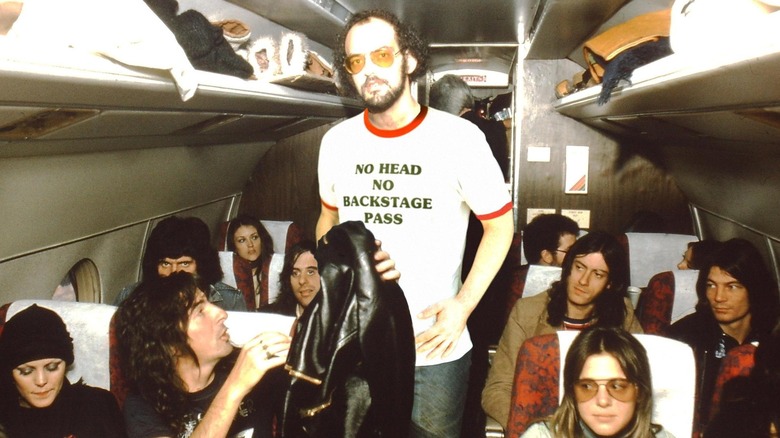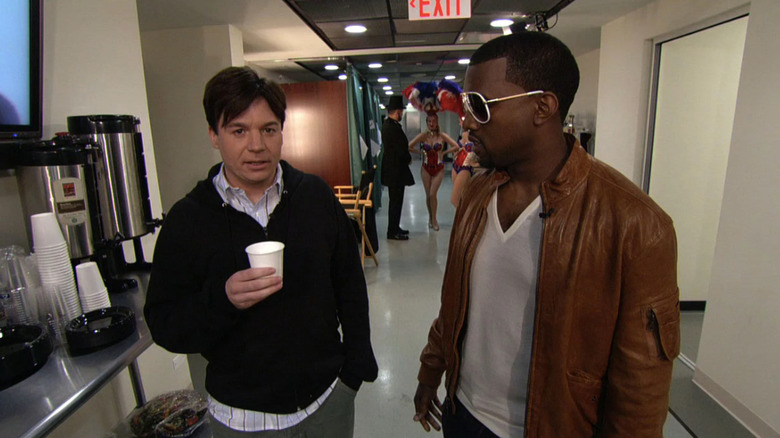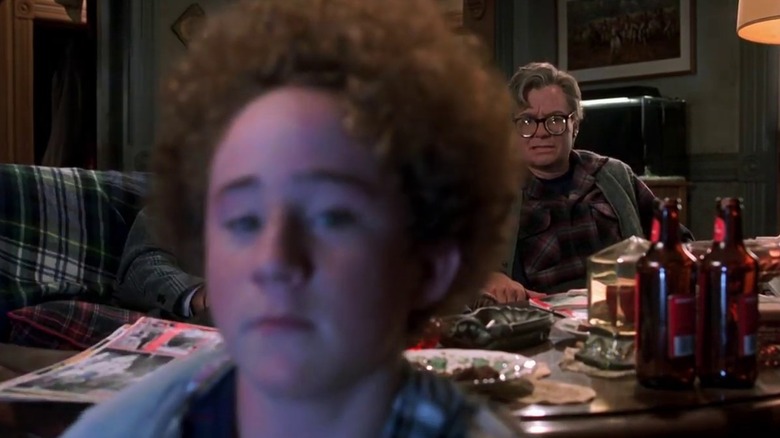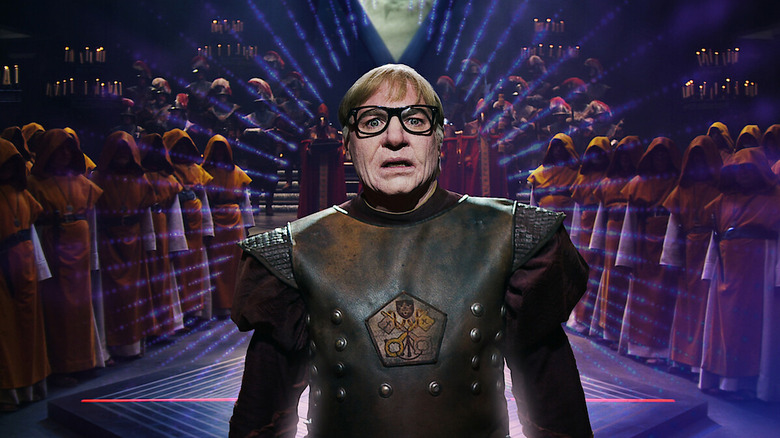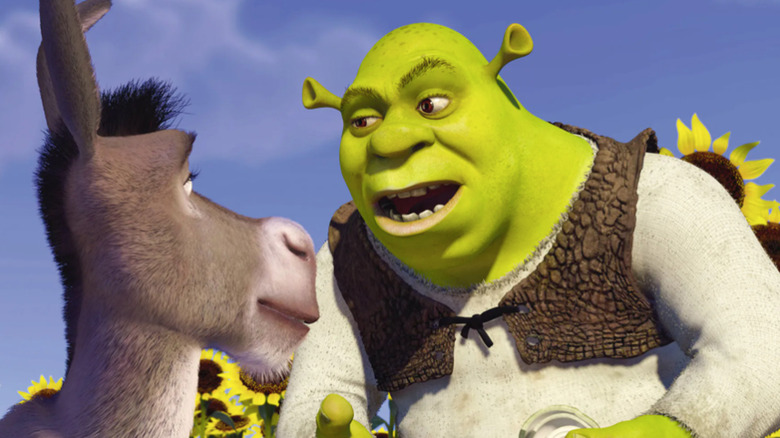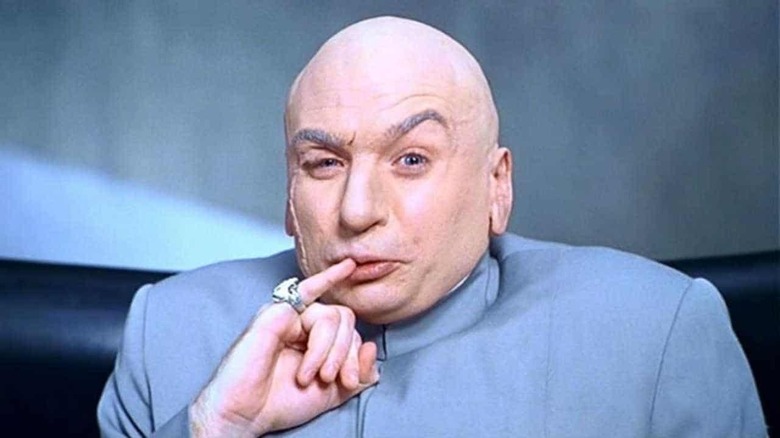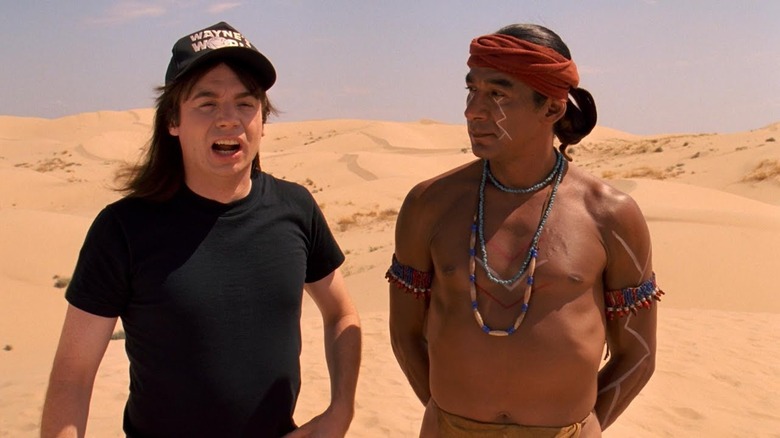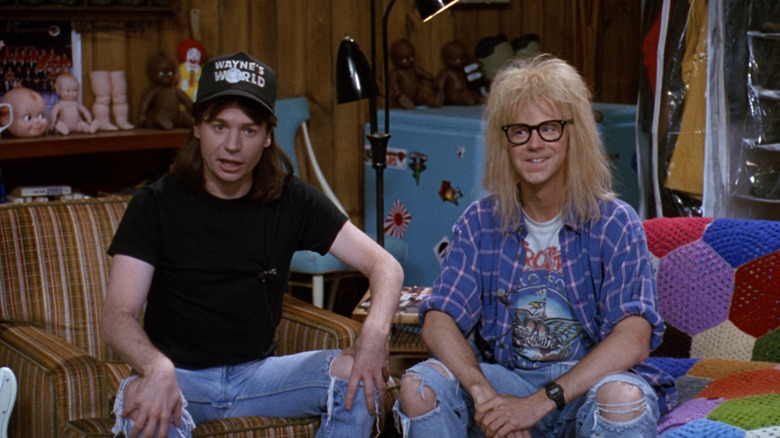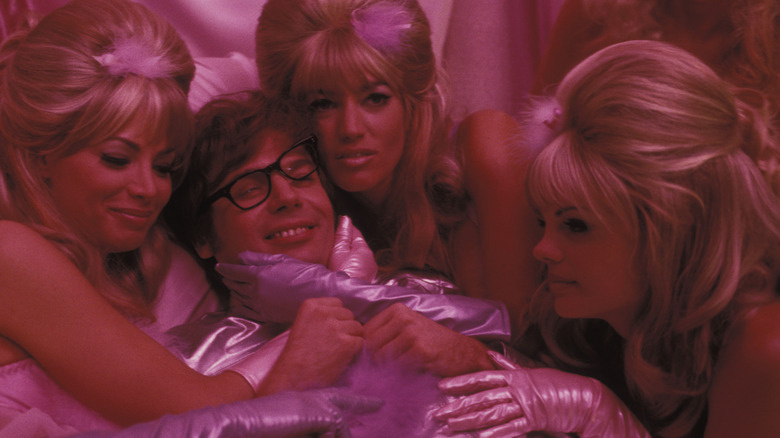The 10 Best Mike Myers Movies And TV Shows, Ranked
Throughout his decades-long career, writer, actor, comedian, and director Mike Myers has been part of not one, not two, but three mammoth movie hits. Google his name, and you'll find stories alternating between the mullet hero of "Wayne's World," a psychedelic spy, or a grumpy green ogre — such is the versatility of this Canadian-born comedy machine.
As if his franchise chops weren't impressive enough, he's also responsible for creating two out of these three blockbuster movie tentpoles. Myers' talent places a focus on character creation and sculpting unique worlds. Audiences have been quick to jump onto whatever bandwagon Myers dreams up. He's one of the most successful and well-known comedians working today.
Funnybones aside, he's also someone who isn't afraid to shake things up and appear where you'd least expect. He recently collaborated on David O. Russell's "Amsterdam," continuing a supporting role trend that saw him appear in Quentin Tarantino's "Inglorious Basterds" and the Rami Malek-starring "Bohemian Rhapsody." While his filmography may not be the longest, its success speaks for itself. With that in mind, here are the 10 best Mike Myers-starring movies and television shows, ranked.
54
Notable for being one of his rare strictly-dramatic performances, Myers' Steve Rubell turned heads when Mark Christopher's "54" debuted in 1998. Steve is the owner of New York's notoriously drug-fueled nightclub, Studio 54. In this drama, audiences follow the rise and decline of Manhattan's infamous hot spot for the rich and famous, as seen through the eyes of the impressionable young employee Shane (Ryan Phillippe). Released by Miramax, the film also starred Neve Campbell, Salma Hayek, and Breckin Meyer — marking a stark departure for Myers, who starred in the mega-hit "Austin Powers: International Man of Mystery" a year prior.
Despite receiving mixed reviews from critics ("54 comes across as little more than "Boogie Nights"-lite," said Empire in 1999), and later receiving a director's cut that changed several key elements, one of the few praised aspects of Christopher's "54" was Myers' performance. One minute, Rubell is funny and playfully charming. Other times, he's sleazy, lascivious, and manipulative. Myers presents all of these conflicting aspects of a complex character to us coated in a layer of digestible humor and his familiar grin.
At first, it might seem like Rubell was another of the star's larger-than-life "Saturday Night Live" comedy character creations. However, as soon as you're alone with him — like in Rubell's sinister encounter with the bartender Greg (Meyer) — the ugly reality of his performance sinks in, and you come crashing down to Earth.
If you or anyone you know needs help with addiction issues, help is available. Visit the Substance Abuse and Mental Health Services Administration website or contact SAMHSA's National Helpline at 1-800-662-HELP (4357).
Supermensch: The Legend of Shep Gordon
Despite being known for wanting to retain creative control over the projects he creates, Myers has only sat in the director's chair once during his career so far. Like most of his output, the top of this 2013 project was close to his heart. "Supermensch: The Legend of Shep Gordon" chronicles the career, exploits, and life-view of the talent manager, film agent, and producer named in its title. Throughout its runtime, it features numerous vox-pops with stars that crossed paths with him throughout their careers.
Insightful and packed with humorous anecdotes, Myers co-directed this documentary with Beth Aala. Myers appears on-screen to detail his long-standing relationship with Gordon. As he explains in the film, the two first crossed paths while working on "Wayne's World." He was the one who convinced Myers to feature a then-new song by one of his clients, Alice Cooper, in the movie — sparking a successful professional partnership and off-screen friendship.
In addition to chronicling Gordon's extensive music career, Myers showcases his personal side and highlights his friendly, Mensch-like qualities. Guest interviewees like Michael Douglas and Sylvester Stallone echo similar sentiments about Gordon. Partway through his feel-good film, Myers admits that "Shep Gordon is the nicest person I've ever met." By the time the credits roll, we understand why he believes that.
Saturday Night Live
Mike Myers was a "Saturday Night Live" cast member from 1989 through 1995. During his time on "SNL," he crafted some of the show's most memorable characters. Of course, the most famous of these is Wayne Campbell — the ripped-denim-wearing, metal-loving, public access TV figure — and titular star of "Wayne's World," the basement-shot show co-hosted by Dana Carvey's Garth. Together, this hugely popular sketch featured a host of celebrity guests, including Tom Hanks, Madonna, and John Goodman. Later, it spawned Penelope Spheeris's now-iconic big-screen adaptation — a film that continues to be the most profitable big-screen spin-off for "SNL."
However, let's not forget all the other memorable moments Myers gave us during his time on the NBC show. There were low-key faves like Hogar, of the Hill People, and the drawing-enthusiast Simon with his ever-changing array of bath buddies. We also saw the Barbra Streisand-obsessed segment titled "Coffee Talk with Linda Richman", the delightfully weird "Sprokets" sketch, and a brilliant advert for British toothpaste.
But one of his most memorable moments saw Myers playing himself during an awkward encounter with the artist currently known as 'Ye', their first since the latter's infamous appearance with Myers at 2005 televised event to support those affected by Hurricane Katrina. "Oh Kanye...I haven't seen you since...When was it?" says Myers, perfectly skewering the moment. "Oh right. I forgot. The telethon..." Brilliant.
So I Married An Axe Murderer
We'd already seen Myers' fascination with life across the pond in various "SNL" sketches like Weekend Update's Scottish reporter Stuart Rankin and the "All Things Scottish" store skits. However, 1993's "So I Married An Axe Murderer" was the first time he brought it to cinemas. Written by Robbie Fox, the film follows Charlie, a part-time beat poet living in San Francisco. Charlie starts a romantic relationship with the beautiful local butcher Harriet (Nancy Travis). All is going well — until Charlie gets the sneaking suspicion that his new GF could be a serial killer? That puts a dampener on things!
Just as "54" stands out as one of Myers' few dramatic performances, "So I Married An Axe Murderer" is notable for being one of the rare comedies he didn't write himself. That said, he put his stamp on Fox's dark rom-com. In addition to playing Charlie, Myers formidably plays the part of his Scottish father, Stuart. Disguised under layers of middle-aged makeup and a pair of huge, jam-jar glasses, it's this permanently annoyed and cutting role that emerges as one of the funniest takeaways from one of the lesser successful Myers' comedies. Need proof? Just watch Stuart ask his son to move out of the way of his beloved telly.
The Pentaverate
Having portrayed multiple roles in previous cinematic outings, it makes sense that when Myers decided to turn his attention back to the small screen, he'd play most of the parts himself. The end result was 2022's "The Pentaverate," his Illuminati-inspired heist comedy that landed on Netflix in early 2022. Myers' skill at character creation, pratfall comedy, and smart-yet-silly wordplay create a six-episode series delivering what you might expect from a Myers-fronted comedy with plenty of laugh-out-loud moments.
"The Pentaverate" shows the mild-mannered Canadian reporter Ken Scarborough (Myers) stumbling into a world controlled by a secret society. The catch here is: They're all really, really nice. Working overtime, Myers plays all of the Illuminati's members — including a take on his friend, Shep Gordon — alongside a bumbling conspiracy theorist determined to expose their plan to the unsuspecting public.
The show was mentioned by Stuart in "So I Married an Axe Murderer." The series also references other elements of Myers' back catalog, including a memorable cameo from Far, Far Away's finest. Meta-elements aside, there is lots to like in "The Pentaverate" if you're a fan of Myers' high-school comedic style. It also contains a great sight gag, suggesting that Canada hasn't quite achieved HD status.
Shrek
It's easy to forget just how much of a massive hit "Shrek" was. Originally developed with Myers' fellow "SNL" alum Chris Farley in mind as its lead, directors Vicky Jenson and Andrew Adamson had to recast the role during production when Farley died from a drug overdose. Myers inherited the role of Shrek and in turn, created one of the most well-known animated characters — and franchises — in recent memory.
Playfully parodying fairytales, "Shrek" follows an ogre who finds love and acceptance after he and his fast-talking donkey pal (Eddie Murphy) decide to rescue a princess (Cameron Diaz) with a secret from an evil king (John Lithgow). Reportedly, Myers originally recorded his dialogue in his normal speaking voice before pivoting to a Scottish accent. Looking back now, it's hard to hear anything but Myers' familiar Scottish voice whenever you see Shrek's iconic face.
Since the 2001 debut of "Shrek," the film has spawned three commercially successful (yet creatively diminishing) direct sequels and several spin-offs — some straight-to-TV movies with others like 2011's "Puss in Boots" hitting cinemas. What's likely the most surprising "Shrek" fact is its unexpectedly sexualized legacy among internet fans, birthed in the wake of the "Shrek is love, Shrek is life" 4Chan meme.
If you or anyone you know needs help with addiction issues, help is available. Visit the Substance Abuse and Mental Health Services Administration website or contact SAMHSA's National Helpline at 1-800-662-HELP (4357).
Austin Powers: The Spy Who Shagged Me
While the original Austin Powers film was a sizeable-enough hit, Austin Powers' second outing pushed things into overdrive. Perhaps its potential could've been predicted straight out of the gate after its teaser trailer brilliantly parodied the world's collective hunger for more "Star Wars." Although the trailer led audiences to believe they were seeing the first look at "Star Wars: Episode I – The Phantom Menace," they instead saw Myers' world-domination-obsessed baddie Dr. Evil laughing at them from the big screen.
While Myers' sequel wasn't as successful as George Lucas's prequel, it wasn't far off. "Austin Powers: The Spy Who Shagged Me" became the third most profitable movie of 1999, right after "The Sixth Sense." As far as cultural success goes, Myers' second most notable cinema character following Wayne Campbell became a zeitgeist — inspiring impressions, Halloween costumes, and everything in between.
Like any good sequel, this one took what worked in the initial film and gave us more of it in a bigger world. As Austin travels back in time to his native 1960s to regain his mojo and thwart a space-set plan by Dr. Evil, audiences meet Verne Troyer's now-iconic Mini Me and Myers's latest grotesque creation, Fat Bastard. As it stands, "Austin Powers: The Spy Who Shagged Me" remains the most financially successful Austin adventure yet.
Wayne's World 2
What do you do after you've surprised everyone by creating the fifth most popular movie of 1992? You put on a concert, obviously! That's what Wayne and Garth did in their quickly-made follow-up to Penelope Spheeris' mega-hit "Wayne's World." During Myers' second stint as slacker Wayne Campbell, he's visited in the night by a naked Indigenous man (Larry Sellers) who urges him to put on a big concert in his hometown of Aurora, Illinois. Guided by his blind belief that "if you book them, they will come," Wayne and Garth make their live music dream a reality. Meanwhile, slick music producer Bobby (Christopher Walken) tries to woo Wayne's hard-rockin' girlfriend, Cassandra (Tia Carrere).
With Stephen Surjik replacing Spheeris at the film's helm, "Wayne's World 2" wasn't as financially successful as its predecessor. However, it still gave us several sequences that have since become quotable gold. From Wayne's badly dubbed battle with Cassandra's father (James Wong), and his painfully awkward encounter with the partial ocular albino to Ralph Brown's "Withnail and I" referencing turn as grizzled roadie Del Preston, and a tense chase ending in a YMCA dance-off. Box office receipts be damned! "Wayne's World 2" still very much rocks.
Wayne's World
Speaking of rocking! When it comes to ranking Myers' characters, few are as iconic as Wayne's Campbell. After debuting the slacker character on "SNL" in 1989, it only took three years for Wayne and Garth to make the leap to multiplexes. In "SNL" history, this marks the second time a film based on a show's sketch had been produced. (Dan Aykroyd and John Belushi's "The Blues Brothers" preceded it in 1980.)
Here, Myers and director Penelope Spheeris whisk us out of Wayne's makeshift studio basement and take us on a guided tour of his world. We visit the duo's favorite food spots and dive bars and eventually meet Wayne's bonafide dream weaver Cassandra (Tia Carrere). When a big studio and its sleazy spokesman Benjamin (Rob Lowe) offer to take their public access show to the big time, Wayne and Garth struggle to hold on to their down-to-Earth morals. Everything that once made them effortlessly cool becomes complicated as their popularity increases.
Besides introducing the world to a lexicon of language that's still very-much used by the generation that grew up with the movie, "Wayne's World" represents everything that was fun, silly, and exciting about discovering carefree comedies. The film's sequences are now legendary movie moments (see: Wayne and Garth's head-banging rendition of Queen's "Bohemian Rhapsody").
Austin Powers: International Man of Mystery
The time period between 1993's "Wayne's World 2" and 1997's "Austin Powers: International Man of Mystery" was a key period for Myers. Having achieved worldwide acclaim in the early '90s, everyone wanted to see what he'd do next. Just a few years prior, his father died following complications with Alzheimer's, leaving Myers grieving and wondering what to do with his memories of his father.
In the end, he funneled his grief into a new film project. Myers spliced his dad's love of James Bond with his fondness for comedy, resulting in "Austin Powers: International Man of Mystery," a film that birthed a franchise and became a cultural phenomenon. Myers' 007 send-up saw him don the ruffled suit of the film's sex-crazed super spy and his Blofeld-like nemesis Dr. Evil. He introduced us to some colorful characters that hilariously played fast-and-loose with well-known spy-genre tropes.
The final product is one of Myers' most popular and significant movies. He proved to the world that he could not only replicate his "Wayne's World" success but improve upon it. "Austin Powers was a tribute to my father and it was my way of handling grief," he told Total Film during the film's 25th anniversary. "The personal significance for me is being able to turn complete grief into celebration."
